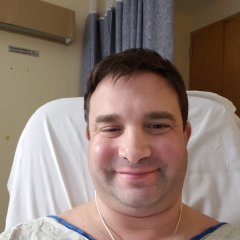Leaderboard
Popular Content
Showing content with the highest reputation on 07/25/2020 in all areas
-
2 points

ASMBS Statement on Resumption of Surgery Released
Suzi_the_Q and one other reacted to Alex Brecher for a post in a topic
American Society for Metabolic and Bariatric Surgery (ASMBS) calls for safe resumption of bariatric and metabolic surgery before COVID-19 pandemic is declared over Newberry, Fla. — Jun. 23, 2020 — The American Society for Metabolic and Bariatric Surgery (ASMBS), the leading organization of bariatric surgeons and integrated health professionals in the nation, declared metabolic and bariatric surgery "medically necessary and the best treatment for those with the life-threatening and life-limiting disease of severe obesity" and called for the safe and rapid resumption of procedures, which have been largely postponed along with other surgeries deemed elective amid the COVID-19 pandemic. In a new position statement entitled, "Safer Through Surgery," published online in the journal SOARD, the ASMBS strongly rejects classifying metabolic and bariatric surgery as "elective" and prefers the use of the term "Medically Necessary Time-Sensitive Surgery" or "Medically Necessary Non-Emergent Surgery" to better characterize the effectiveness of the intervention and the progressive nature of the many diseases it treats including obesity, type 2 diabetes, hypertension and heart disease. "COVID-19 may be a factor for quite some time and the longer the treatment of obesity, type 2 diabetes and other related diseases are postponed, the greater the chance they will become worse," said Matthew M. Hutter, MD, MPH, president of the ASMBS and professor of surgery at Harvard Medical School. "Each state, doctor and patient must make a decision as to when conditions for metabolic and bariatric surgery are right, but the sooner it can be safely performed, the more quickly obesity, type 2 diabetes and other diseases can be reduced or resolved." The ASMBS recommends that the precise timing for surgery be carefully considered based on factors including an individual patient’s health status, local prevalence of COVID-19 and the availability of resources including hospital beds, ventilators and personal protective equipment (PPE). The ASMBS statement concludes, "Before COVID-19 began, it was clear that patients with obesity were ‘safer through surgery’. In the era of COVID-19, ‘safer through surgery’ for patients with obesity may prove to be even more important than before." Obesity has been identified as an independent risk factor for adverse outcomes including death among COVID-19 patients. Metabolic/bariatric surgery has been shown to be the most effective and long-lasting treatment for severe obesity. 1 Its safety profile is comparable to some of the safest and most commonly performed surgeries in the U.S. including gallbladder surgery, appendectomy and knee replacement. 2 An estimated 252,000 bariatric surgeries were performed in the United States in 2018, which is approximately less than 1 percent of the population eligible for surgery based on BMI. 3 The U.S. Centers for Disease Control and Prevention (CDC) reports 42.4 percent of Americans had obesity in 2017-2018. 4 Obesity has been linked to more than 40 diseases including type 2 diabetes, hypertension, heart disease, stroke, sleep apnea, osteoarthritis and at least 13 different types of cancer. 5,6,7 About the ASMBS The ASMBS is the largest organization for bariatric surgeons in the nation. It is a non-profit organization that works to advance the art and science of bariatric surgery and is committed to educating medical professionals and the lay public about bariatric surgery as an option for the treatment of severe obesity, as well as the associated risks and benefits. It encourages its members to investigate and discover new advances in bariatric surgery, while maintaining a steady exchange of experiences and ideas that may lead to improved surgical outcomes for patients with severe obesity. For more information, visit www.asmbs.org. ### 1 Weiner, R. A., et al. (2010). Indications and principles of metabolic surgery. U.S. National Library of Medicine. 81(4) pp.379-394. https://www.ncbi.nlm.nih.gov/pubmed/20361370 2 Gastric Bypass is as Safe as Commonly Performed Surgeries. Health Essentials. Cleveland Clinic. Nov. 6, 2014. Accessed October 2017 https://health.clevelandclinic.org/2014/11/gastric-bypass-is-as-safe-as-commonly-performed-surgeries/ 3 https://asmbs.org/resources/estimate-of-bariatric-surgery-numbers 4 https://www.cdc.gov/obesity/data/adult.html 5 The Effectiveness and Risks of Bariatric Surgery: An Updated Systematic Review and Meta-analysis, 2003-2012. Accessed from: https://jamanetwork.com/journals/jamasurgery/fullarticle/1790378 6 Steele CB, Thomas CC, Henley SJ, et al. Vital Signs: Trends in Incidence of Cancers Associated with Overweight and Obesity — United States, 2005-2014. MMWR Morb Mortal Wkly Rep2017;66:1052-1058. DOI: http://dx.doi.org/10.15585/mmwr.mm6639e1 7 Centers for Disease Control and Prevention. (2015) The Health Effects of Overweight and Obesity. Accessed from: https://www.cdc.gov/healthyweight/effects/index.html -
1 point

Abnormal EKG?! :-(
Machta reacted to WhatATool:-) for a post in a topic
Just wanted to let you all know that my doctor wasn’t concerned and I’m approved to move forward! 10 days pre op!! 😊 -
1 pointWell, it’s not about being “bad” or “cheating” on your diet. The dietary guidelines at this point are to make sure your stomach heals and prevent you from getting sick. There’s nothing magical about the one week or two week or six week point that change your stomach into the next phase. These times are based on how long most people take to heal to the point that they can handle different types of food. I personally hate vomiting, so I don’t want to do anything to take a chance of making myself sick. I started puréed foods today and my first food was 1 ounce of triple zero yogurt, eaten slowly with a baby spoon. If you eat foods before you can handle them, you’re taking the chance that your stomach might react badly and that will be the punishment. There’s no need to feel guilty on top of that. if you’re going to eat something you’re not supposed to, though, jerky is probably not the best choice since it is dry and tough. If you’ve really got to have meat, go with something soft like canned or slow-cooked chicken.
-
1 point

Normal people just don't get it!!!
Suzi_the_Q reacted to PolkSDA for a post in a topic
The only people who know about my surgery are my immediate coworkers. I've not told anyone else: family, friends, nada... precisely for this very reason. People who may be well-intentioned but don't realize that we don't need the lecturing or coaching. I figure I'll let the results speak for themselves, and they can bring it up as they notice I've lost weight. At that point, they don't really have a leg to stand on, whereas talking about it before the fact or in the early stages leaves you open to recrimination at worst or "helping" at best. Note: That's my personal approach; others' will vary. -
1 point

Normal people just don't get it!!!
Suzi_the_Q reacted to Napua for a post in a topic
I made the choice not to mention this to others. I avoided the negative feedback. I am doing the bypass for my health and live a healthier lifestyle with this bypass as a tool to help me. I tested this out by saying, what do you think of my friend who is going to have a bypass to help her lose weight for her health? All the response was negative. -
1 point

ASMBS Statement on Resumption of Surgery Released
GreenTealael reacted to Alex Brecher for a post in a topic
ASMBS Guidelines/Statements Safer through surgery: American Society for Metabolic and Bariatric Surgery statement regarding metabolic and bariatric surgery during the COVID-19 pandemic Executive Council of ASMBS Published: June 05, 2020 DOI: https://doi.org/10.1016/j.soard.2020.06.003 The surgical treatment of obesity and its complications has been postponed in many parts of the world during the COVID-19 pandemic, similar to the postponements for nonurgent surgical treatment of many other human conditions and disease processes. Many have characterized bariatric and metabolic surgery along with cosmetic plastic surgery as clear-cut examples of elective procedures that must be postponed during COVID-19. Some U.S. states have included these types of procedures in their state-wide order as examples of “elective” surgical procedures that should be the last to be restarted. For those who define “elective” surgery as not necessary or optional, the American Society for Metabolic and Bariatric Surgery (ASMBS) asserts that metabolic and bariatric surgery is NOT elective. Metabolic and bariatric surgery is medically necessary and the best treatment for those with the life-threatening and life-limiting disease of severe obesity. The definition of elective in the Merriam-Webster dictionary is “relating to, being, or involving a non-emergency medical procedure and especially surgery that is planned in advance and is not essential to the survival of the patient.” Metabolic and bariatric surgery is life-saving surgery, with multiple studies confirming the survival benefit for patients treated by surgery over those treated without surgery [1]. Metabolic and bariatric surgery creates long-term changes in metabolism and reduces or eliminates multiple serious obesity-related diseases improving long-term health and quality of life as well as survival. The ASMBS supports the use of the term “medically necessary time-sensitive surgery,” as proposed by Prachand et al. [2], or “medically necessary nonemergent surgery,” as far superior to the term “elective” surgery and what it connotes. Metabolic and bariatric surgery should be restarted when it is safe to do so. The ASMBS disagrees with the concept that bariatric surgery should be postponed until the pandemic is declared over. The global nature of the pandemic, the potential for a second wave or persistent ongoing infection in some parts of the world, along with more traditional risks, such as annual influenza outbreaks, make postponement potentially indefinite. There is clear evidence bariatric surgery improves survival [1] and significantly improves the disease of obesity and several critical obesity-related conditions (including diabetes, hypertension, and cardiovascular events). Obesity and obesity-related diseases have been identified as independent risk factors for adverse outcomes in COVID-19 infection [3], including need for intubation, ventilatory support, intensive care unit care, and mortality. From a patient-centered and public health standpoint, it is critical to resume metabolic and bariatric surgery. We also understand that obesity and related diseases are the same risk factors that must be taken into consideration for temporarily postponing bariatric surgery in certain higher-risk subsets of patients. The risks and benefits at that particular time for that specific patient need to be carefully considered. Factors to consider in making that decision also include the local prevalence of COVID-19, the availability of testing, the available resources, including hospital beds, ventilators, and personal protection equipment, as well as strategies to protect healthcare workers and patients. However, delay in the life-saving surgical treatment of obesity and its complications for many months or years is not in the best interest of our patients. The ASMBS has advocated for many years that patients suffering from the disease of obesity and its many serious associated diseases should strongly consider metabolic and bariatric surgery as a life-changing intervention that improves health, quality of life, and long-term survival. COVID-19 is the most recent of many diseases in which underlying obesity worsens the prognosis. Before COVID-19 began, it was clear that patients with obesity were “safer through surgery.” In the era of COVID-19, “safer through surgery” for patients with obesity may prove to be even more important than before. PIIS155072892030318X.pdf -
1 point

MAY-JUNE-JULY 2020 BYPASSERS UNITE!! Veterans Welcome too!
Repeatingthoughts reacted to MaybeMeow for a post in a topic
YAY! Welcome to the other side! Hope you're home soon. The first week is the hardest. Just survive. Stay hydrated. That's your only goal the first couple days. -
1 pointYep, same thing exactly happened to me, went in at 290 after losing 22 on the pre-op diet. Discharged at 297. I had a real hard time getting water in to start with at home, so once I started peeing a lot I knew it was the edema and swelling releasing the IV fluids that had accumulated.
-
1 pointALERT: his new name is New&Improved. He changed his name every time we acknowledged his arrogance. From Mikeyy to Mike666, to Superman84, to MIKEYY84.
-
1 point

lapband to sleeve
chloeharper reacted to SteveT74 for a post in a topic
I don't think you should be anymore worried about the sleeve than you were with the band. Even though the sleeve seems more radical, from a surgery and risk standpoint, the sleeve is probably safer. You're not installing a foreign body that could slip, dislodge or cause significant injury. For me, the recovery from surgery has been a relative breeze (not the case for everyone), but I honestly had very little pain after surgery and no nausea. I was drinking normally (without restricting) after 3 days and I haven't had an issue with eating at all. Obviously, there is an adjustment to the new restriction, but that's probably something you're already familiar with after the sleeve. After any surgery, there's always going to be something. My aunt has a band and, frankly, I think my recovery from the sleeve was easier than hers. I was expecting to be in a lot of pain, with terrible gas issues etc. I know everyone's experience is different, but I recall having a little pain and nausea when I first came out of anesthesia (which you can barely remember anyway). I know I told them I had pain and nausea when the attending nurse was talking to me--but I also recall thinking, give me the good stuff now because I don't want to feel pain and nausea (if it does happen). They gave me a little something and I went back to sleep. I woke up a few hours later and all I could think about was how badly I needed to pee--which isn't easy after being under general anesthesia. Aside from needing to pee, I had no nausea and no pain. I had some gas and bloating (to be expected), but it wasn't terrible at all!!! I was on the floor with a women who got a lap band the same day I was sleeved. She had the same gas etc that I had. I don't think that part of the experience really differs much between the procedures. I had gas-ex chewables that I brought to hospital with me and that really helped. I slept sitting up the first couple of nights (get a good travel/neck pillow), which was more comfortable for me. Keep walking--it helps. Longer term, I really snapped back quickly. I could drink normally after a couple of days. My program had me start on the puree/soft food stage right after I was released from the hospital (which is different from most). After a couple of days, I could eat relatively normally as well. Obviously, I can't eat large quantities any more, but I can definitely eat a 4-6oz piece of tilapia (stuffed with lump crab meat and a little ricotta) and I feel very satisfied. In the beginning you can feel everything you swallow all the way down into your stomach. I haven't felt that in a week or two. I was frankly worried that my doctor didn't make my sleeve small enough or that the surgery isn't working right--since I was able to drink so easily and eat without feeling pain or discomfort--but I think I am just lucky. I have had issues with constipation and GERD, but these are all manageable. Most importantly, the weight is coming off!!! I have lost 18 pounds since surgery (and 30 since I started my pre-op diet). I have dropped 6.5 inches off my waistline since the day of surgery. As of this week, I have been taken off all my diabetes medications. Obviously, my initial concern that the surgery wasn't going to work for me, was misplaced!!! That said, I am highly motivated to loose this weight and live a healthy lifestyle. This is the first time in 15 years that I actually believe and know that I can have the body and good health I deserve. I am also not relying on the surgery to do all the work for me. I am sticking very closely to my doctor's post-op diet guidelines. The only modification that I made was to cut carbs down to 20g net carbs per day and to focus on eating my protein first and then good fats along with it (like avocado). I have also been hitting the gym--treadmill, elliptical and spin classes (I haven't been cleared for weight training yet). In short, having this operation was one of the best decisions of my life. I have no regrets (other than not doing it sooner)!!!! Don't be nervous!!! It's going to be worth it!!!!!







